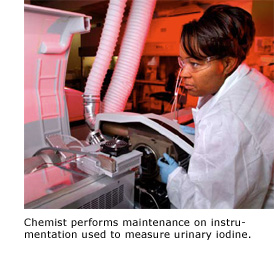Whilst we all know that iodine is critical to making thyroid hormone, and too little can be a “bad thing”, the real world uncertainty continues. Here we have one paper claiming that pregnant women in part of England are clearly deficient in iodine – and we should perform a national survey. (Note: They don’t suggest a campaign to persuade pregnant women to a) get tested; b) take an appropriate iodine supplement.) And another paper claiming that too much iodine is behind at least some inflammatory thyroid disease. It could quite possibly be that both are absolutely correct.
I am always wary of iodine supplementation. My own ignorance plus my lack of faith in others means that I simply do not know which way any individual should jump. However, it does seem to be getting pretty clear that a lot of pregnant women in England, possibly the whole of the UK, should consider taking an iodine-containing supplement during their pregnancies – hopefully achieving the Goldilocks result - not too little, not too much, but just right. (Maybe those considering becoming, or likely to become, pregnant should be guided in the right direction. It seems unlikely to be optimal to become pregnant with low iodine and only then do anything about it. We are often told that early pregnancy is so very important.)
Whatever else, I hope these abstracts make it obvious that the subject of iodine is not yet properly understood, and still less is it managed sensibly.
Br J Nutr. 2014 Jan 7:1-10. [Epub ahead of print]
Iodine deficiency in pregnant women living in the South East of the UK: the influence of diet and nutritional supplements on iodine status.
Bath SC, Walter A, Taylor A, Wright J, Rayman MP.
Author information
Department of Nutritional Sciences, Faculty of Health and Medical Sciences, University of Surrey, Guildford GU2 7XH, UK.
Abstract
Iodine is a key component of the thyroid hormones which are crucial for brain development. Adequate intake of iodine in pregnancy is important as in utero deficiency may have lifelong consequences for the offspring. Data on the iodine status of UK pregnant women are sparse, and there are no such data for pregnant women in the South East of the UK. A total of 100 pregnant women were recruited to a cross-sectional study carried out at the Royal Surrey County Hospital, Guildford, at their first-trimester visit for an ultrasound scan. The participants provided a spot-urine sample (for the measurement of urinary iodine concentration (UIC) and creatinine concentration) and 24 h iodine excretion was estimated from the urinary iodine:creatinine ratio. Women completed a general questionnaire and a FFQ. The median UIC (85•3 μg/l) indicated that the group was iodine deficient by World Health Organisation criteria. The median values of the iodine:creatinine ratio (122•9 μg/g) and of the estimated 24 h iodine excretion (151•2 μg/d) were also suggestive of iodine deficiency. UIC was significantly higher in women taking an iodine-containing prenatal supplement (n 42) than in those not taking such a supplement (P< 0•001). In the adjusted analyses, milk intake, maternal age and iodine-containing prenatal supplement use were positively associated with the estimated 24 h urinary iodine excretion. Our finding of iodine deficiency in these women gives cause for concern. We suggest that women of childbearing age and pregnant women should be given advice on how to improve their iodine status through dietary means. A national survey of iodine status in UK pregnant women is required.
PMID: 24398008 [PubMed - as supplied by publisher]
ncbi.nlm.nih.gov/pubmed/243...
Arq Bras Endocrinol Metabol. 2013 Dec;57(9):727-32.
[Correlation between iodine urinary levels and pathological changes in thyroid glands].
[Article in Portuguese]
Boasquevisque PC, Jarske RD, Dias CC, Quintaes IP, Santos MC, Musso C.
Abstract
OBJECTIVES:
To determine iodine nutrition in the population and to correlate levels of iodine found in random samples of urine with pathological changes observed in thyroids collected in this population.
MATERIALS AND METHODS:
Urinary iodine was determined in 30 random samples of urine and the pathological study was carried out in 55 thyroid glands from corpses received by the Department of Forensic Medicine of Vitória, Espírito Santo, Brazil from May to August 2011.
RESULTS:
In 29 urine samples (96.7%) urinary iodine was above the maximum limit recommended by the World Health Organization (WHO), of 300 mg/L. Fourteen thyroids (25.5%) showed the presence of histological changes compatible with thyroiditis. Higher levels of iodine in urine were observed in females and in of thyroid that showed inflammation (thyroiditis).
CONCLUSIONS:
We conclude that, in this population, there is excess iodine intake, and greater incidence of inflammatory thyroid disease.
PMID: 24402019 [PubMed - in process]
ncbi.nlm.nih.gov/pubmed/244...
If anyone can read Portuguese, they might wish to read the full text which is available. 
Rod


